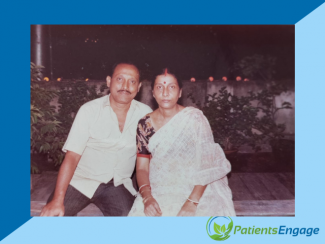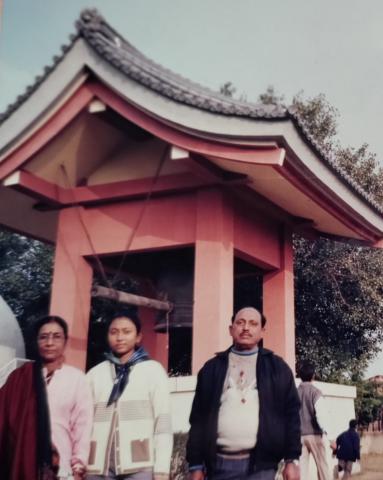
Ankita Bardhan was diagnosed with Type 1 Diabetes when she was only 13, which threw her parents in a state of shock and disbelief. Her parents talk of the journey since, the challenges and how Ankita has learnt to handle the condition well.
Was it a shock for you when Ankita was diagnosed with Type 1 Diabetes? Or is there any history of diabetes in the family? How did you go for the diagnosis?
It was an absolute shock for us, so much so that when the doctor told us for the first time that she had diabetes we thought the doctor had mixed up patients.
It remains a shock even to this day how we landed up in this situation.
Ankita's father is Type 2 diabetic. But when she went down with fever for a week before the diagnosis or had a black out three weeks before that, we, not in our wildest dreams, linked it to Diabetes. Even the doctor we took her to asked us to get her tested for usual diseases like malaria, typhoid etc
On the fateful day of diagnosis, from the morning she was in a daze, she couldn't stand without help and was gradually losing her energy to even sit by herself.Then she went into incoherent speech and finally slipped into a coma.
We took her to the hospital where we learnt about her diagnosis for the first time.
Since she was diagnosed at an early age (13 years), how difficult was it for you to make her follow the rules of diabetes management?
We are lucky that she followed the rules herself. She can take all the credit there. She has been very disciplined with regards to the condition and we didn't need to do anything.
Did you at all manage to detect her first symptoms as something needing medical attention?
She had all the symptoms like losing weight, being tired, suffering extreme hunger, extreme thirst, going for frequent urination. But at that point in time there was no awareness about this condition at all (not that we have much now as well, unfortunately). We attributed all her symptoms to some common cause.For instance, we ascribed extreme thirst to the heat of peak summer and we were at that time truly in the middle of a heat wave. Frequent urination, we thought, was due to extreme thirst and a high intake of water, as a result of it. We thought she was always tired because of her heavy dance practice as she had her dance exam coming up shortly.
Managing diabetes is a whole new chapter in life, specially tough if it is about a teenager. How did you help Ankita?
True that it is tough but she is very matured about her condition. She doesn't grumble or is unreasonable. . She has made peace with the condition and has always stayed on top of her condition. She has done an excellent job and we are very very proud of her.
Ankita must have had emotional upheavals too, given that her normal life was disturbed. How did you help restore some semblance of normalcy for her? What were your scary moments?
She did have emotional downs, that's common because it is a very demanding condition. It is always there at the back of mind. We try to be there for her. We patiently deal with her mood swings and most importantly we make sure that she knows we trust her and we will be there for her always no matter how bad the situation is.
What were the main challenges of Ankita’s condition?
She had a phase where her glucose levels just refused to come down from 500mg/dl, no matter how much insulin she took. Her insulin level went up to 120units per day during that time. We, along with the doctor's help, went to various other doctors but nobody could help. Lucky for us that one day the glucose levels went down on its own. Apart from that, she also had huge fluctuations, like 600mg/dl in the morning to 30mg/dl in the afternoon. These were the main two challenges of her condition. By God's grace, now all these are controlled.
How was her social life curtailed?
Initially her social life was curtailed because going out for parties or meals were a huge deal as outside food needed to be monitored carefully to control the glucose levels. Also, there were people who judged her condition, not to mention the victim shaming. A person with Type 1 diabetes is never directly responsible for her condition but that was hard to explain to everyone. At one point she thought all these were too much to handle and she contained her social life. Later on she decided, people and society will judge and be unkind no matter what we do and she chose to go out socially, not paying too much attention to people’s reactions. As I said she has made her peace and now nothing bothers her.
Read Ankita's personal story: I hate diabetes with the bottom of my heart
She had to unlearn and learn things and read up on Diabetes to manage this technical part of it. Now managing glucose levels with food consumed outside the house has also been achieved. She has managed to strike the balance which is sadly not perfect everytime, but then life is not perfect, so we make mistakes and learn.
How did family and friends react to Ankita’s condition? How did you handle that?
Honestly, God has been very kind regarding our family and friends who were completely supportive and protective.

What are the unhelpful comments that you have had to face? Has people’s lack of awareness been a deterrent?
The lack of awareness about Diabetes as a condition and the misinformation that one is subjected to is an issue by itself. People have come up with various comments that Ankita is high maintenance, she is defective, handicapped, and even a burden. But, with time, we have managed to ignore these comments, because these people are by large not willing to know or learn anything. So we decided not to waste our energy in explaining things to them in making them aware. A person who takes the effort to increase his awareness will not judge and will listen but maybe in today's fast paced world we don't have time to listen to others.
Any special message for parents with Diabetes children?
Learn to trust your child, know that it is hard and only they know what they are going through. The entire world can be empathetic but will never be in their shoes. Replicating the job of pancreas and maintaining sanity at the same time is a taxing job which does not allow any relief. Do not negate any feeling that your child might be going through. The world is unkind enough so we should be their safe space.






